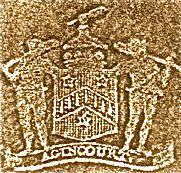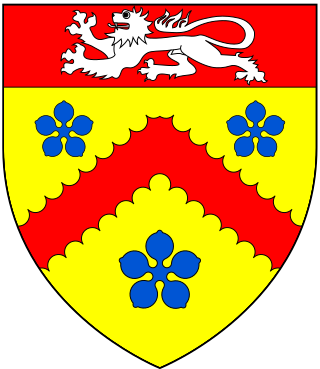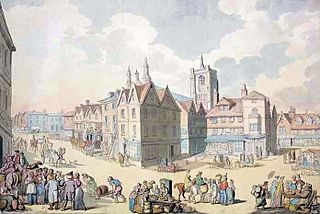Related Research Articles

Wodehouse is an English surname and barony.

Earl of Gosford is a title in the Peerage of Ireland. It was created in 1806 for Arthur Acheson, 2nd Viscount Gosford.

Earl of Kimberley, of Kimberley in the County of Norfolk, is a title in the Peerage of the United Kingdom. It was created in 1866 for the prominent Liberal politician John Wodehouse, 3rd Baron Wodehouse. During his long political career, he notably held office as Lord Lieutenant of Ireland, Secretary of State for the Colonies, Secretary of State for India and Secretary of State for Foreign Affairs. He was succeeded by his son, the second Earl. At first a Liberal like his father, he later joined the Labour Party, becoming the first Labour member of the House of Lords. His eldest son, the third Earl, represented Norfolk Mid in the House of Commons as a Liberal. Since 2002, the titles are held by the latter's grandson, the fifth Earl.

Baron Macdonald, of Slate in the County of Antrim, is a title in the Peerage of Ireland. It was created in 1776 for Sir Alexander Macdonald, 9th Baronet, of Sleat. The Macdonald family of Sleat descends from Uisdean Macdonald, also known as Hugh of Sleat, or Hugh Macdonald, who was an illegitimate son of Alexander Macdonald, Earl of Ross. On 28 May 1625, his great-great-great-great-grandson Donald Gorm Og Macdonald was created a baronet, of Sleat in the Isle of Skye in the County of Inverness, in the Baronetage of Nova Scotia. The baronetcy was created with remainder to heirs male whatsoever and with a special clause of precedence which provided that it should have precedency over all former baronets.

Baron Muskerry is a title in the Peerage of Ireland. It was created in 1781 for Sir Robert Deane, 6th Baronet. He had previously represented County Cork in the Irish House of Commons.
Baron Huntingfield is a title created three times, twice in the Peerage of England and once in the Peerage of Ireland. The first two creations were by writ, but little more is known about them, except that John de Huntingfield, who was created Baron Huntingfield in 1362, married Margery de Welles, daughter of John de Welles, 4th Baron Welles. John was dead by December 1376, when Margery remarried. Both titles probably became extinct or fell into abeyance on the death of their first holders. The third creation, Baron Huntingfield, of Heveningham Hall in the County of Suffolk, was created in the Peerage of Ireland in 1796 for Sir Joshua Vanneck, 3rd Baronet, Member of Parliament for Dunwich. His son, the second Baron, also represented this constituency in the House of Commons. His great-grandson, the fifth Baron, was Conservative Member of Parliament for Eye and Governor of Victoria. As of 2013 the titles are held by the latter's grandson, the seventh Baron, who succeeded his father in 1994.
Baron Harvey of Tasburgh, of Tasburgh in the County of Norfolk, is a title in the Peerage of the United Kingdom. It was created on 3 July 1954 for the diplomat Sir Oliver Harvey on his retirement as British Ambassador to France. In November the same year he also succeeded his half-brother as fourth Baronet of Crown Point.
There have been four baronetcies created for people with the surname Hoare, one in the Baronetage of Ireland, one in the Baronetage of Great Britain and two in the Baronetage of the United Kingdom. The second holder of the third creation was raised to the peerage as Viscount Templewood in 1944.

Colonel Sir Armine Wodehouse, 5th Baronet, was a British Tory politician and military officer.

The Beauchamp-Proctor, later Proctor-Beauchamp Baronetcy, of Langley Park in the County of Norfolk, is a title in the Baronetage of Great Britain. It was created on 20 February 1745 for the twenty-two-year-old William Beauchamp-Proctor, subsequently Member of Parliament for Middlesex. Born William Beauchamp, he assumed the additional surname of Proctor according to the will of his maternal uncle, George Proctor, of Langley Park, Norfolk. The second Baronet married Mary Palmer, a beauty who was the subject of portraits by George Romney and Benjamin West. The third Baronet was an admiral in the Royal Navy.
There have been three baronetcies created for persons with the surname Everard, one in the Baronetage of Ireland, one in the Baronetage of England and one in the Baronetage of the United Kingdom. Only one creation is extant as of 2010.

The Wedderburn, later Ogilvy-Wedderburn Baronetcy, of Balindean in the County of Perth, is a title in the Baronetage of the United Kingdom created in 1803.

The Buckworth, later Buckworth-Herne, later Buckworth-Herne-Soame Baronetcy, of Sheen in the County of Surrey, is a title in the Baronetage of England. It was created on 1 April 1697 for John Buckworth, High Sheriff of London in 1704. The second Baronet sat as Member of Parliament for Weobley. The third Baronet was Assistant Gentleman Usher to George II. The fifth Baronet was Gentleman-Pensioner and Exon of the Guard during the reign of George III. He married Anne, daughter of Paston Herne, of Haveringland Hall, Norfolk, and assumed by Royal licence the additional surname of Herne. The sixth Baronet assumed in 1806 by Royal licence the additional surname of Soame in compliance with the will of Sir Peter Soame, 4th Baronet, of Thurlow. The ninth Baronet was a member of the Shropshire County Council.

There have been three baronetcies created for persons with the surname Cooke, two in the Baronetage of England and one in the Baronetage of Ireland. One creation is extant as of 2013.
The Castleton Baronetcy, of St Edmundsbury in the County of Suffolk, was a title in the Baronetage of England. It was created on 9 August 1641 for William Castleton, High Sheriff of Suffolk from 1641 to 1642. The second Baronet was High Sheriff of Suffolk from 1660 to 1661. The sixth Baronet was Rector of Gillingham, Norfolk. The eleventh Baronet was Rector of Thornham, Norfolk. The title became extinct on the death of the twelfth Baronet in 1810.

Sir Peter Gleane (1564–1633) was an English politician who sat in the House of Commons from 1628 to 1629.
Peter Gleane may refer to:
Sir Drue Drury, 1st Baronet was an English landowner and politician who sat in the House of Commons between 1621 and 1624.

Sir Peter Gleane, 1st Baronet was a member of the East Anglian gentry and Member of the Parliament of England.